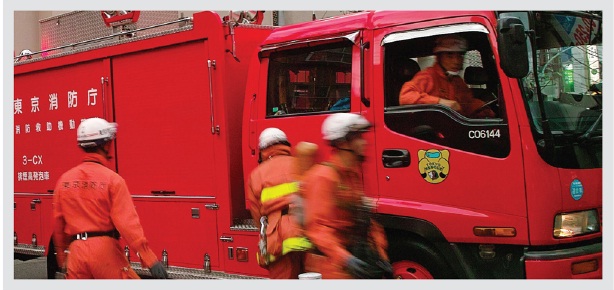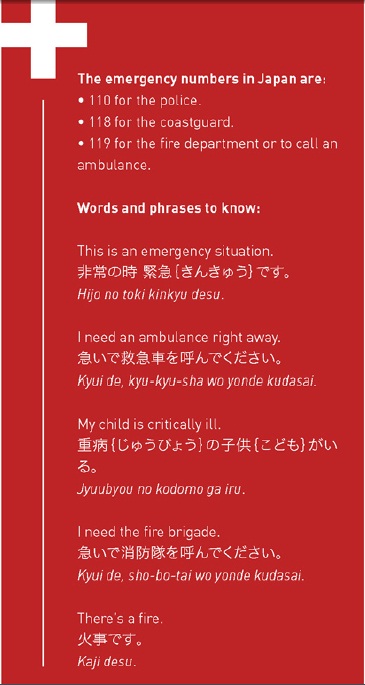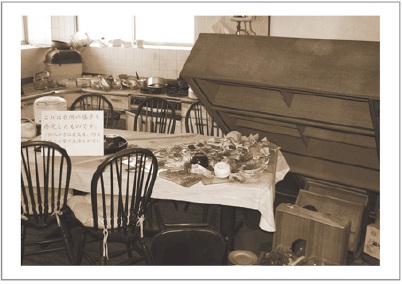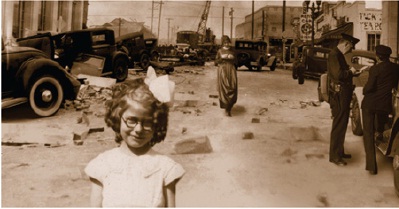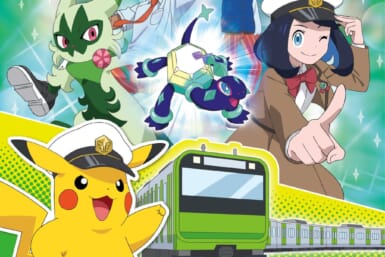Do you know…how to direct [emergency services]
to your house in a land whose blessed streets have no names?
Would you know exactly what to do if your child suddenly needed to go to a hospital? Do you know what the emergency numbers are in Japan, how to ask for an ambulance, and, trickiest of all, how to direct them to your house in a land whose blessed streets have no names?
You also need to give your name, address, and telephone number in Japanese and a memorable landmark so that the ambulance will have a better chance of locating you. If there was ever a case for keeping a laminated copy of information by the phone, this would be it! Once they have told you that they are on their way, get someone to stand outside on the street so that they can help to direct it to your house. What happens if your injury or sickness is not serious enough to call an ambulance but you still need to get to the local Accident and Emergency (A&E) ward (Emergency Room)? If you think you can make it to the hospital by yourself, you are welcome to use a taxi or drive yourself (not obvious in all countries!).
Don’t know where the nearest A&E ward is? Himawari (tel. 03-5285-8185) is a countrywide government organization that provides information on hospitals and clinics and the medical and health insurance systems in Japan. The staff can speak English, Chinese, Korean, Thai, and Spanish, and most usefully offer a telephone translation service should you need it when you get to the hospital. Their opening times are weekdays from 5am-8pm and 9am-8pm on weekends and public holidays.
A similar service is run by the Tokyo Metropolitan Health and Medical Information Center (Tokyo-to Hoken Iryo Joho Center) tel. 03-5285-8181, available daily from 9am-8pm. They also speak English, Chinese, Korean, Thai, and Spanish. Lastly, the Shinjuku Ward website has very useful pages on what to say when you get to the hospital in both English and Japanese: www.city.shinjuku.tokyo.jp.
Earthquake Safety Tips:
I feel the earth move under my feet…prepare for the big one right now!
As we all know, it’s not a matter of if, it’s a matter of when the next devastating earthquake will occur in Japan. Seismic experts predict that this event will definitely take place within the next fifty years and, as parents, you will all want to be as prepared as possible for your children’s sakes.
The Tokyo Metropolitan government website (metro.tokyo.jp) provides comprehensive online advice for foreign nationals on what to do if an earthquake strikes. Tips on what to do should you be on an underground train or how to stay in touch with your family, as chances are mobile telephones will be out, make for grimly compulsive reading but prove very informative and could save your life. Meanwhile, here are some ideas for making your home as safe as possible:
- Secure your furniture to the wall using special brackets. Yes, they are ugly, but they save lives.
- Ensure you know how to switch off gas, water, oil, and electricity.
- Install fire extinguishers and know how to use them.
- Assemble and maintain an emergency kit. This should include a first aid section but also spare clothes, money, candles, toiletries, and stocks of any medication you are currently taking. If your children are still tiny, extra baby food, sachets of formula milk, or diapers could come in really handy!
- Keep a pair of runners, bottled water, and snacks at your office should you need to walk home.
by Elise Mori

